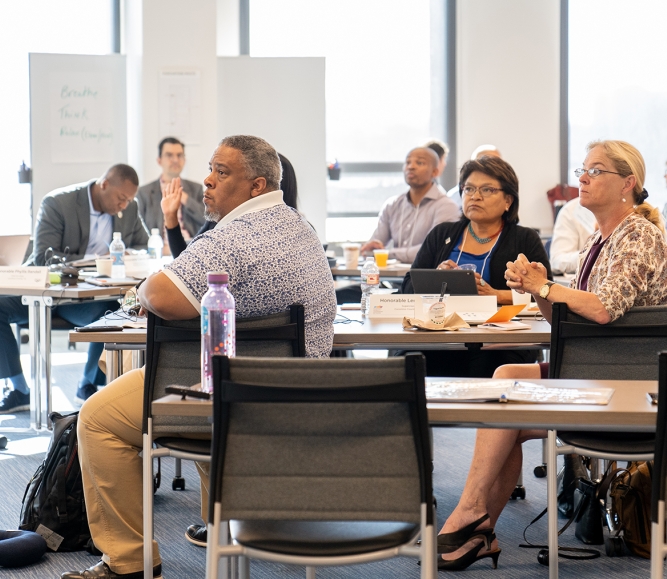County Policy Playbook for an Equitable Economic Recovery

Author
Upcoming Events
Related News
In July of 2021, NACo’s Economic Mobility Leadership Network (EMLN) launched a small sub-cohort within the EMLN to focus on developing equitable economic recovery initiatives that ensure short- and long-term recovery and sustainability. Participating counties received customized technical assistance and seed funding to build internal planning capacity and execute elements of their customized plans. This project is based on NACo’s research on counties’ needs and challenges as they work to recover from the COVID-19 pandemic. This report was informed by NACo’s nationwide county member survey, 15 one-on-one interviews and two virtual focus groups with nine participating counties each.
The Executive Summary outlines the four pillars of an equitable economic recovery: Data-Informed Decision Making, Thriving Through Partnerships, Public Policy to Support Communities and Thriving Through Resource Alignment. To enact a whole-of-government response and recovery effort, counties need a clear direction and framework for action.
Data-Informed Decision Making
Data is critical to making, executing and studying the impacts of public policy decisions, county investments and program or service administration. From internal performance indicator tracking to external dashboards that increase transparency and community engagement, county governments have endless opportunities to leverage data, including in economic recovery. This brief explores the county data science lifecycle and two county efforts to use data-informed decision making to drive an equitable economic recovery.
Thriving Through Partnerships
County governments have varied authority to support equitable recovery efforts based on state statute, individual charter provisions and county ordinances.. To achieve equitable economic recovery goals, counties frequently partner with community-based organizations that can act as specialty service providers in areas where counties may not have direct authority, capacity or relationships. This brief explores the types of partnerships counties can engage in to foster an equitable recovery, including formal contractual agreements with nonprofits and private businesses, memorandums of understanding (MOU) and shared work agreements.
Public Policy to Support Communities
Public policy is the framework which guides local government programming and administrative systems. Each act, program, ordinance or investment by a county stems from public policies shaped by elected leaders, community members and public servants. Effective public policy sets local governments on a path to success while ineffective public policy can create inefficiencies or barriers to achieving intended impacts. This brief explores how counites can leverage public policy to set the course for county government action.
Thriving Through Resource Alignment
Confronted with competing priorities, county leaders must balance resources to best serve the needs of all residents. County resources consist of both financial and human capital, as counties employ more than 3.6 million public servants and make annual investments totaling more than $600 billion. This brief explores how proper alignment of these resources can allow counties to efficiently respond to community needs.
Featured Initiative
Economic Mobility Leadership Network
The network supports county leaders to develop successful economic mobility strategies for their local communities.


Counties and Railroads: Shared Priorities for the Next Surface Transportation Bill
County leaders from across the country have a vital opportunity to ensure their infrastructure priorities are front and center.

House reintroduces bipartisan legislation to level playing field for rural communities
House reintroduced the Rural Partnership and Prosperity Act, bipartisan legislation intended to advance economic development in rural counties and overcome barriers to obtaining federal funding and resources.

Podcast: Eastern Tennessee counties invest in tourism during shutdown
Sevier County, Tenn. refused to let the government shutdown devastate its fall tourism draw—Great Smoky Mountains National Park. County Mayor Larry Waters describes the lengths he and his neighbors went to keep the park open. And NACo Chief Government Affairs Officer Mark Ritacco offers an outlook on what counties can take away from the shutdown and into the future.